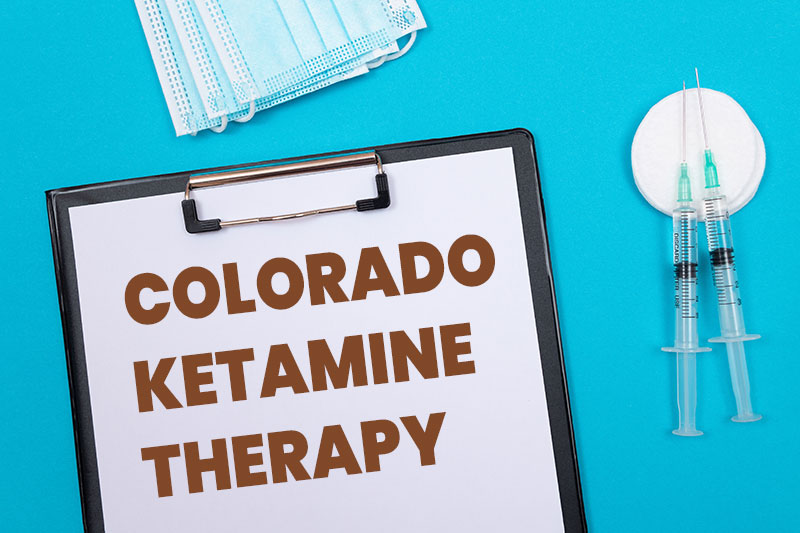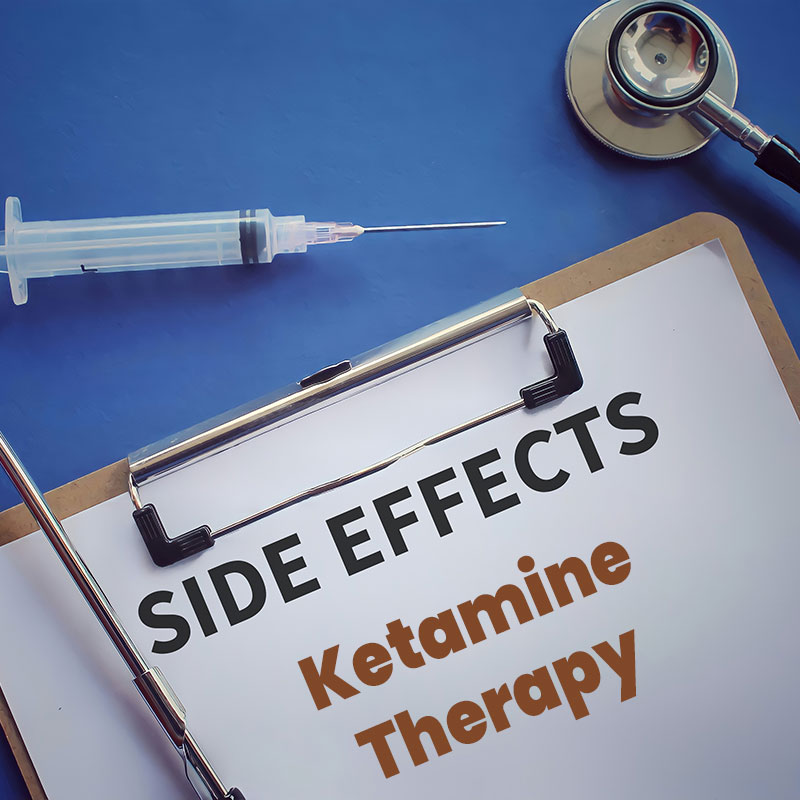Ketamine Therapy Colorado
For more information regarding Ketamine therapy in Colorado:

Ketamine Therapy Colorado Overview
Ketamine therapy involves the use of ketamine, a dissociative anesthetic, as a treatment for various mental health conditions.
Initially used primarily as an anesthetic, ketamine has gained attention for its rapid-acting antidepressant effects in recent years. In therapy, ketamine is administered under controlled conditions, often through intravenous infusion, nasal spray, or oral lozenges. It’s used to treat conditions such as depression, anxiety, post-traumatic stress disorder (PTSD), and chronic pain that have not responded to traditional treatments.
Ketamine works by modulating certain neurotransmitters in the brain, such as glutamate, and promoting the growth of new neural connections. Its fast-acting nature makes it particularly useful for individuals experiencing severe symptoms or those at risk of suicide.
However, ketamine therapy typically requires ongoing monitoring and maintenance to sustain its benefits.
It’s essential to undergo ketamine therapy under the guidance of qualified medical professionals in a clinical setting.
For more information regarding Ketamine therapy in Colorado:
Ketamine Therapy Availability in Colorado
Colorado, known for its progressive approach to mental health treatment, offers a range of options for individuals seeking ketamine therapy.
With a growing recognition of ketamine’s effectiveness in treating depression, anxiety, PTSD, and chronic pain, many clinics and practitioners across the state now provide this innovative treatment.
Whether you reside in Greeley, Fort Collins, Loveland, or any other part of the state, access to ketamine therapy is becoming increasingly available.
With a focus on safety, professionalism, and patient-centered care, Colorado’s Ketamine therapy Colorado providers strive to offer a supportive environment for healing and transformation.
What is Ketamine Therapy?
Ketamine therapy involves the administration of ketamine, a dissociative anesthetic, as a treatment for various mental health conditions.
Originally used primarily as an anesthetic in medical settings, ketamine has garnered attention for its rapid-acting antidepressant and anxiolytic effects in recent years.
In therapy, ketamine is administered under controlled conditions, often through intravenous infusion, intramuscular injection, nasal spray, or oral lozenges. The therapy is conducted in a clinical setting, supervised by qualified medical professionals.
Ketamine therapy has shown promise in treating conditions such as depression, anxiety, post-traumatic stress disorder (PTSD), and chronic pain, particularly in cases where traditional treatments have been ineffective.
The therapeutic effects of ketamine are believed to involve the modulation of certain neurotransmitters in the brain, such as glutamate, and the promotion of neuroplasticity.
However, ketamine therapy requires ongoing monitoring and may involve multiple sessions to maintain its benefits.
It’s important for individuals considering ketamine therapy to undergo comprehensive evaluation and consultation with healthcare providers to determine suitability and ensure safe and effective treatment.

How Colorado Ketamine Therapy Works as a Treatment
Ketamine works as a treatment through its unique pharmacological effects on the brain.
It primarily acts by blocking NMDA receptors, which are involved in the transmission of the neurotransmitter glutamate. This blockade leads to increased levels of glutamate in certain brain regions, particularly the prefrontal cortex.
The increase in glutamate, along with other mechanisms, triggers a cascade of molecular and cellular changes that are thought to contribute to its therapeutic effects.
One significant effect of ketamine is its ability to rapidly increase the production of brain-derived neurotrophic factor (BDNF), a protein that promotes the growth and resilience of neurons. This increase in BDNF levels is believed to play a key role in enhancing neural plasticity, or the brain’s ability to adapt and form new connections.
Additionally, ketamine may have anti-inflammatory properties and can modulate the release of other neurotransmitters, such as serotonin and dopamine, which are involved in mood regulation.
Overall, ketamine’s mechanism of action results in rapid and robust antidepressant effects, often within hours or days of administration. These effects are distinct from traditional antidepressants, which typically take weeks to exert their full therapeutic effects.
The precise mechanisms underlying ketamine’s antidepressant effects are still being investigated, and research in this area is ongoing.
Benefits of Ketamine Therapy Colorado
Ketamine therapy offers several potential benefits for individuals struggling with treatment-resistant mental health conditions and chronic pain. Some of the key benefits include:
Rapid Onset of Action:
One of the most significant advantages of ketamine therapy is its rapid onset of action. Many individuals experience relief from symptoms within hours or days of treatment, as opposed to the weeks or months often required for traditional antidepressants to take effect. This rapid improvement can be particularly beneficial for individuals experiencing severe symptoms or in crisis.
Effective for Treatment-Resistant Conditions:
Ketamine therapy has shown promise in treating various treatment-resistant mental health conditions, including depression, anxiety, post-traumatic stress disorder (PTSD), and obsessive-compulsive disorder (OCD). It may also be beneficial for individuals who have not responded to other forms of treatment, such as antidepressant medications or psychotherapy.
Long-Lasting Effects:
While the immediate effects of ketamine therapy may wear off after a few days or weeks, some individuals experience prolonged relief from symptoms even after treatment has ended. This sustained improvement may be attributed to ketamine’s ability to promote neural plasticity and the growth of new neural connections in the brain.
Reduction in Suicidal Thoughts:
Ketamine therapy Colorado has been shown to rapidly reduce suicidal ideation in individuals with depression and other mood disorders. This reduction in suicidal thoughts can be life-saving for individuals in crisis and provide them with the relief needed to engage in further treatment and support.
Improvement in Quality of Life:
Beyond symptom relief, ketamine therapy has the potential to improve overall quality of life for individuals struggling with mental health conditions and chronic pain. By alleviating symptoms and promoting emotional well-being, ketamine therapy can enable individuals to regain a sense of control, function better in daily life, and engage more fully in relationships and activities they enjoy.
It’s important to note that while ketamine therapy offers promising benefits, it may not be suitable for everyone, and potential risks and side effects should be carefully considered and discussed with a qualified healthcare provider.

Colorado Ketamine Therapy Safety Regulations
In Colorado, ketamine therapy is subject to certain safety considerations and regulations to ensure its responsible and ethical use in clinical settings. These considerations typically encompass several key areas:
Medical Supervision:
Ketamine therapy should be administered under the supervision of qualified healthcare professionals, such as physicians, nurse practitioners, or registered nurses, who have received appropriate training in the administration and monitoring of ketamine treatment. This helps ensure patient safety and optimal treatment outcomes.
Screening and Evaluation:
Prior to initiating ketamine therapy, patients should undergo thorough screening and evaluation to assess their suitability for treatment. This includes assessing their medical history, current medications, psychiatric symptoms, and any potential risk factors for adverse reactions or complications. Patients with certain medical or psychiatric conditions may not be suitable candidates for ketamine therapy.
Informed Consent:
Patients should be fully informed about the potential risks, benefits, and alternatives of ketamine therapy before consenting to treatment. This includes discussing the expected effects of treatment, possible side effects, and any contraindications or precautions. Informed consent ensures that patients can make well-informed decisions about their care and treatment options.
Treatment Setting:
Ketamine therapy should be administered in a safe and appropriate clinical setting, such as a medical office, hospital, or licensed ketamine clinic. The treatment environment should meet certain standards for cleanliness, privacy, and patient comfort, and be equipped to handle any potential emergencies or adverse reactions that may arise during treatment.
Monitoring and Follow-up:
Patients undergoing ketamine therapy should be closely monitored throughout treatment to assess their response, monitor for any adverse reactions or side effects, and ensure their safety and well-being. Regular follow-up appointments may be scheduled to track progress, adjust treatment as needed, and provide ongoing support and guidance.
Regulatory Compliance:
Ketamine therapy providers in Colorado are subject to certain regulatory requirements and standards of practice governing the use of ketamine and other controlled substances in medical settings. These regulations may include requirements related to licensure, training, record-keeping, and compliance with state and federal laws governing the use of ketamine for medical purposes.
Adherence to safety considerations and regulations is essential to ensure the responsible and ethical use of ketamine therapy in Colorado and to safeguard the well-being of patients undergoing treatment. Individuals considering ketamine therapy should seek treatment from reputable and qualified providers who prioritize patient safety and adhere to established standards of care.

Common Mental Health Conditions Treated with Ketamine Therapy Colorado
Ketamine therapy has shown promise in treating a variety of mental health conditions, particularly those that have been treatment-resistant or have not responded well to traditional therapies. Some of the most common mental health conditions treated with ketamine therapy include:
Depression:
Ketamine therapy has gained significant attention for its rapid and robust antidepressant effects. It has been shown to provide relief from symptoms of depression, including low mood, feelings of hopelessness, fatigue, and suicidal ideation. Ketamine may be particularly beneficial for individuals with treatment-resistant depression or those experiencing acute depressive episodes.
Anxiety Disorders:
Ketamine therapy has been investigated as a potential treatment for various anxiety disorders, including generalized anxiety disorder (GAD), social anxiety disorder, panic disorder, and post-traumatic stress disorder (PTSD). It may help alleviate symptoms such as excessive worry, fear, intrusive thoughts, and avoidance behaviors.
Post-Traumatic Stress Disorder (PTSD):
Ketamine therapy has shown promise in reducing symptoms of PTSD, such as intrusive memories, flashbacks, hypervigilance, and emotional numbness. It may help individuals process traumatic memories and experiences, facilitating healing and recovery.
Obsessive-Compulsive Disorder (OCD):
While research on ketamine therapy for OCD is still in its early stages, preliminary studies have suggested that ketamine may have potential as a treatment for OCD symptoms, including intrusive thoughts, compulsive behaviors, and anxiety.
Bipolar Disorder:
Ketamine therapy may be beneficial for individuals with bipolar disorder, particularly during depressive episodes. It has been shown to provide rapid relief from symptoms of depression and may help stabilize mood and prevent relapse.
Chronic Pain with Comorbid Depression or Anxiety:
Ketamine therapy Colorado may be used to treat chronic pain conditions, such as fibromyalgia, neuropathic pain, and complex regional pain syndrome (CRPS), particularly in individuals who also experience comorbid depression or anxiety. Ketamine’s antidepressant and analgesic properties may provide relief from both pain and associated mental health symptoms.
It’s important to note that while ketamine therapy offers promising benefits for these mental health conditions, it may not be suitable for everyone, and potential risks and side effects should be carefully considered and discussed with a qualified healthcare provider. Additionally, ketamine therapy is typically used as part of a comprehensive treatment plan that may include other therapies, such as psychotherapy and medication management, to address the individual needs of each patient.
What is the Colorado Ketamine Therapy Process?
The ketamine therapy process typically involves several key steps, outlined below:
Initial Consultation:
The process usually begins with an initial consultation with a qualified healthcare provider, such as a psychiatrist or licensed therapist, who specializes in ketamine therapy. During this consultation, the provider will conduct a thorough assessment of your medical history, current symptoms, treatment goals, and any previous treatments you’ve tried. This consultation is an opportunity for you to ask questions, discuss any concerns, and determine if ketamine therapy is a suitable option for you.
Medical Evaluation:
Before starting ketamine therapy, you’ll undergo a comprehensive medical evaluation to ensure that you’re medically fit to receive treatment. This evaluation may include a physical examination, review of your current medications, and screening for any medical conditions or risk factors that may affect your eligibility for ketamine therapy.
Treatment Planning:
Once you’ve been deemed eligible for ketamine therapy, your healthcare provider will work with you to develop a personalized treatment plan tailored to your specific needs and goals. This plan may include details such as the frequency and duration of treatment sessions, the method of ketamine administration (e.g., intravenous infusion, intramuscular injection, nasal spray), and any additional therapies or support services that may be recommended to enhance treatment outcomes.
Treatment Sessions:
Ketamine therapy sessions typically take place in a clinical setting, such as a medical office, hospital, or licensed ketamine clinic, under the supervision of trained medical professionals. The frequency and duration of treatment sessions may vary depending on your individual response to treatment and treatment goals. During each session, you’ll receive the prescribed dose of ketamine through the chosen method of administration and will be monitored closely throughout the session to ensure your safety and comfort.
Monitoring and Follow-Up:
Following each ketamine therapy session, you’ll be monitored closely by medical staff to assess your response to treatment and monitor for any potential side effects or adverse reactions. Depending on your individual needs, your healthcare provider may schedule regular follow-up appointments to track your progress, adjust your treatment plan as needed, and provide ongoing support and guidance throughout the course of treatment.
Integration and Support:
Ketamine therapy Colorado is often used as part of a comprehensive treatment plan that may include other therapies, such as psychotherapy, medication management, and lifestyle interventions, to address the underlying causes of your symptoms and support your overall well-being. Your healthcare provider will work with you to integrate ketamine therapy into your broader treatment plan and provide support and guidance as needed throughout your journey to recovery.
It’s important to note that the ketamine therapy process may vary depending on individual circumstances and treatment protocols, and it’s essential to undergo ketamine therapy under the guidance of qualified healthcare professionals in a clinical setting to ensure safe and effective treatment.

What Are the Common Side Effects of Colorado Ketamine Therapy?
Ketamine therapy, like any medical treatment, may be associated with certain side effects, although they are generally mild and temporary. Some possible side effects of ketamine therapy include:
Psychological Effects:
Ketamine is known to induce dissociative and psychedelic effects, which may include feelings of detachment from reality, altered perception of time and space, visual or auditory hallucinations, and changes in mood or thought patterns. These effects are usually transient and typically resolve shortly after the ketamine infusion is completed.
Physical Effects:
Common physical side effects of ketamine therapy may include dizziness, lightheadedness, nausea, vomiting, increased heart rate, elevated blood pressure, and changes in sensory perception (such as numbness or tingling). These effects are generally short-lived and tend to dissipate as the ketamine infusion wears off.
Emergence Reactions:
In some cases, individuals may experience emergence reactions during or shortly after a ketamine infusion, characterized by agitation, confusion, disorientation, or dysphoria. These reactions are usually mild and can often be managed with reassurance, supportive care, and, if necessary, medication to help alleviate symptoms.
Post-Infusion Symptoms:
Following a ketamine infusion, some individuals may experience lingering symptoms such as fatigue, drowsiness, headache, or mild cognitive impairment. These symptoms typically resolve within a few hours or days and can be managed with rest, hydration, and self-care measures.
It’s important to note that serious adverse reactions to ketamine therapy are rare when treatment is administered under appropriate medical supervision and in accordance with established protocols. Healthcare providers who offer ketamine therapy are trained to monitor patients closely during treatment sessions and to respond promptly to any adverse reactions or complications that may arise.
The risk of experiencing significant side effects from ketamine therapy is low, and most individuals tolerate treatment well. However, it’s essential to discuss any concerns or questions about potential side effects with your healthcare provider before undergoing ketamine therapy, and to follow their guidance throughout the treatment process.
How Should People Prepare for Colorado Ketamine Therapy?
Preparing for ketamine therapy in Colorado involves several steps to ensure a safe and positive treatment experience. Here are some preparation tips for patients considering ketamine therapy:
Research and Education:
Take the time to educate yourself about ketamine therapy, including its potential benefits, risks, and side effects. Research reputable sources of information and discuss any questions or concerns with your healthcare provider before starting treatment.
Medical Evaluation:
Before undergoing ketamine therapy, undergo a comprehensive medical evaluation with a qualified healthcare provider to assess your eligibility for treatment. Provide your healthcare provider with a detailed medical history, including any current medications, medical conditions, allergies, or previous treatments you’ve tried.
Discuss Expectations:
Have an open and honest discussion with your healthcare provider about your treatment goals, expectations, and concerns regarding ketamine therapy. This will help ensure that your treatment plan is tailored to your specific needs and preferences.
Review Pre-Treatment Instructions:
Follow any pre-treatment instructions provided by your healthcare provider, such as fasting requirements or restrictions on certain medications or substances. These instructions are designed to optimize the safety and effectiveness of ketamine therapy.
Arrange Transportation:
Ketamine therapy may leave you feeling drowsy, lightheaded, or disoriented after treatment, so it’s important to arrange for transportation to and from your treatment sessions. Consider asking a friend or family member to accompany you or using a ride-sharing service to ensure you can travel safely.
Create a Comfortable Environment:
Prepare your treatment space to be as comfortable and relaxing as possible. Consider bringing items that help you feel calm and at ease, such as headphones, a blanket, or a favorite book or music playlist.
Stay Hydrated:
Drink plenty of water in the days leading up to your ketamine therapy session to ensure you’re well-hydrated. Proper hydration can help minimize potential side effects and improve the effectiveness of treatment.
Practice Self-Care:
Prioritize self-care in the days leading up to your ketamine therapy session. Get plenty of rest, engage in activities that help you relax and unwind, and take time to focus on your mental and emotional well-being.
By following these preparation tips, you can help ensure a smooth and positive ketamine therapy experience in Colorado.
Remember to communicate openly with your healthcare provider throughout the treatment process and to seek support if you have any questions or concerns along the way.
